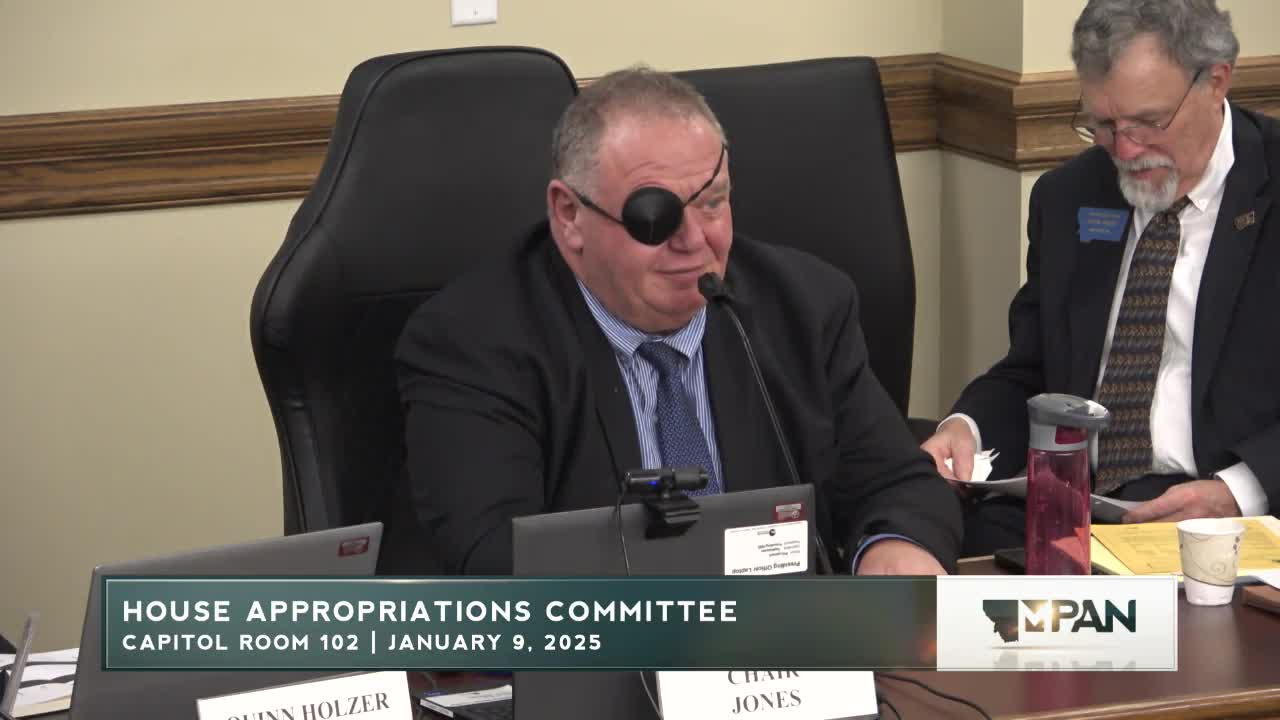House committee hears House Bill 13 pay plan that would raise state salaries, health contribution and per diem
Get AI-powered insights, summaries, and transcripts
Subscribe
Summary
Representative John Fitzpatrick presented House Bill 13 to a House committee as the administration's negotiated state pay plan, outlining two salary increases for employees, a higher employer contribution to the state health plan, per diem tied to the federal rate and a phased increase to legislative pay tied to Montana's average wage.
Representative John Fitzpatrick, sponsor of House Bill 13, told a House committee that the bill would enact the negotiated state pay plan and carry appropriations to fund it.
"First, it provides a salary adjustment of $1 per hour or 2.5 percent of salary, whichever is greater on both July 2025 and again in July 2026," Fitzpatrick said, adding that the 2.5 percent adjustment applies to employees earning $83,000 or more. He also described provisions to increase the state's employer share of health insurance and to tie per diem to the federal rate.
The bill's four core components, as presented by Fitzpatrick and administration witnesses, are: two salary increases (July 2025 and July 2026), an increase in the employer share of the state health plan (an additional $26 per month in each year of the biennium), a change to travel meal per diem tied to the federal per diem (set at 70 percent of the federal rate), and a phased increase in legislative pay tied to the state average hourly wage (80 percent in 2027, 100 percent in 2029).
Budget director Ryan Osmundson said the administration supports the package. "This is a very important bill," he told the committee, praising the bargaining teams and calling the increase modest but meaningful. Carol Ann Davis, chief labor negotiator for the governor, told legislators the negotiated increases are intended to help retain and recruit employees and to sustain improvements made in turnover over the past two years.
Misty Ann Giles, director of the Department of Administration's benefits work, described changes to the state health plan included in the negotiated agreement. The proposal raises the employer share incrementally and increases employee-facing elements such as the Live Life Well incentive (the plan's wellness incentive) and tobacco surcharges. Giles said the state plan covers roughly 28,000 lives and that health-care costs have risen faster than other categories in recent years.
Agency directors and union representatives uniformly supported passage. Department of Corrections Deputy Director Brian Goodkin and Department of Transportation Deputy Director Larry Flynn said earlier pay moves reduced vacancy and turnover rates in their agencies and urged continued investment to sustain services such as inmate medical care, road maintenance and federally funded infrastructure programs. Justin Hukaluk of the Montana Federation of Public Employees and other union leaders asked the committee to approve the negotiated package.
Committee members pressed administration witnesses on the fiscal details and the health-plan outlook. Deputies and the deputy budget director Amy Sassano explained that the employer health-share increase is an expense to agencies but becomes revenue to the state's self-funded health plan enterprise; the plan operates on a calendar year while the university plan operates on a fiscal year, so timing differences affect first-year costs. Witnesses said current reserves are sufficient under the proposal but cautioned additional revenue may be needed in the next biennium.
Representative Fitzpatrick said the bill's appropriations are spread across fund sources; he summarized the bill's totals as approximately $71.9 million in general fund, $32.9 million in state special revenue and $19.2 million in federal funds to support the pay and benefit changes. Committee members asked for supplemental detail and the administration's actuarial calculations; budget staff said they would provide additional breakdowns for members.
No committee vote or final action on House Bill 13 occurred at the hearing. The committee received proponents, informational witnesses and questions from members; the hearing closed with the sponsor asking for a "do pass" recommendation.
